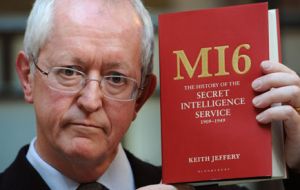MercoPress. South Atlantic News Agency
Book reveals MI6 helped prevent communist revolution in Brazil in 1935
 Professor Keith Jeffery poses for photographers with his book “MI6 The History of the Secret Intelligence Service 1909-1949
Professor Keith Jeffery poses for photographers with his book “MI6 The History of the Secret Intelligence Service 1909-1949 The most detailed and authoritative history of the first forty years (1909-1949) of the British Secret Intelligence Service, MI6, was released this week by the London publishers, Bloomsbury and in the USA by Penguin.
Among the fascinating exploits of SIS revealed in the book are the role the Service performed in the US, during both World Wars, in persuading the Americans to support the British war effort. There are also insights into how SIS helped prevent a Communist revolution in Brazil in 1935, how, during the Second World War, SIS supervised the work of the code-breakers of Bletchley Park, the role of the SIS in North Africa, the build-up to D-Day, and the Service’s role in tracking the development of German V-weapons.
This unique publication, written by Professor Keith Jeffery, of Queen’s University, Belfast, is based on his unrestricted access to SIS archives of the period. The result is an 800-page story of the world’s oldest continuously operating foreign intelligence service from its birth, in 1909, to the beginning of the Cold War, according to a release from the Foreign Office.
Throughout the pages of this history, the values of courage and dedication held by the men and women who served in SIS are graphically displayed. The history also underscores another constant theme, that of the Service’s accountability to government for its actions both in peace and war.
The plan to write the definitive history of SIS began five years ago when Sir John Scarlett, the then Chief of SIS, set the project in motion.
“Professor Jeffery’s history gives a view of the men and women who, through hard work, dedicated service, character and courage, helped to establish and shape the Service in its difficult and demanding early days. I see these qualities displayed every day in the current Service as SIS staff continues to face danger in far flung places to protect the United Kingdom and promote the national interest. I know my predecessors would be as proud as I am of the men and women of the Service today” said Sir John Sawers, current chief of SIS.
Reflecting on the importance of the Service to the country, the Foreign Secretary, William Hague, said that the history of our Secret Intelligence Service provides a unique insight into an organisation of great national and international importance.
“It sets out in compelling detail how SIS developed over forty years from modest beginnings to be a world leading intelligence service. The debt of gratitude we owe to our intelligence and security services is hard to overstate. Without their unstinting efforts, the defence of this country, its values and way of life would have been imperilled many times” added the Foreign Secretary.
The History traces the story of the Secret Intelligence Service from its founding under the leadership of Mansfield Cumming, before the First World War, through to the beginning of the Cold War.
The book contains vivid accounts of SIS successes in the First World War such as the secret agent organisation, “La Dame Blanche”, responsible for providing invaluable information on enemy troop movements; secret reporting from inside Germany, and the daring exploits of Lieutenant Augustus Agar VC, during the Russian Revolution, who sank several Soviet warships in attacks using fast motor boats.
Among other dramatic stories told for the first time from the archive, are the ‘Venlo Incident” which saw the Gestapo capture two SIS officers, and the infamous “Zinoviev Letter”, and the role of SIS in its dissemination. The history also clarifies SIS’s relationship with the famous Special Operations Executive (SOE) where the requirements of sabotage often conflicted with the needs of an intelligence gathering organisation.
“Being granted such unparalleled access to the archives of an organisation so immersed in the culture of secrecy was a fantastic privilege. I am grateful for the trust and cooperation of all Service staff and I hope readers of this history will find it as engrossing as I did in writing it” said Keith Jeffery commenting on the process of writing the story.




Top Comments
Disclaimer & comment rulesCommenting for this story is now closed.
If you have a Facebook account, become a fan and comment on our Facebook Page!